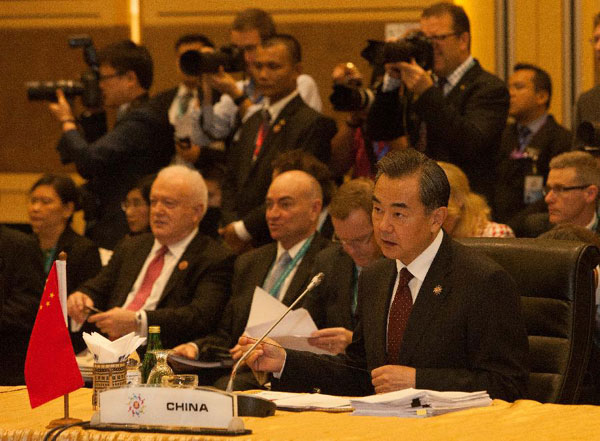Chinese FM rejects Philippine, Japanese, US claims on South China Sea issue
Updated: 2015-08-07 10:04
(Xinhua)
|
||||||||
|
 |
|
Chinese Foreign Minister Wang Yi (R front) speaks during the East Asia Summit Foreign Ministers' Meeting in Kuala Lumpur, Malaysia, on Aug. 6, 2015. [Photo/Xinhua] |
KUALA LUMPUR - "As to the land reclamation in the South China Sea which some countries are concerned about, it is neither something that happened recently nor initiated by China. In other words, 'the status quo' of the South China Sea has been changing over the years," Wang said.
China began construction projects on some manned islets of the Nansha islands, he said, emphasizing that they are aimed at improving working and living conditions on those islets with strict environmental standards.
The Chinese minister informed his fellow counterparts that by the end of June, China has completed the land reclamation. The next step is to build facilities primarily used for public purposes, including lighthouse, maritime emergency rescue, weather station, marine scientific research as well as medical and first- aid buildings.
"Once the construction is completed, China is willing to open these facilities to countries in the region. As the largest coastal country in the South China Sea, China has the ability and obligation to provide these maritime public goods to countries in the region," Wang said.
He pointed out that an arbitration request over the South China Sea issue was mentioned by the Philippines at the East Asia and ARF foreign ministers' meetings in an attempt to smear China.
"I would like to respond with facts. First, to settle disputes through direct negotiations between relevant parties is the way advocated by the Charter of the United Nations and a common international practice," Wang said. "More importantly, it is also clearly stated in the Declaration on the Conduct of Parties in the South China Sea (DOC). To this end, China has proposed bilateral talks with the Philippines and this proposal is still valid. But until today, the Philippine side still refuses our proposal."
As to the proceeding of starting international arbitration, Wang said the normal practice is that a consensus should be reached first by the countries concerned.
"However, neither did the Philippines inform China in advance, nor it sought China's consent. The Philippines just unilaterally and forcefully initiated the arbitration," he said. "The Chinese side cannot understand this act, and could only think that there were ulterior motives behind this."
The Chinese minister contended that Manila should know that China has already issued a statement in 2006 that it does not accept the arbitration under the provisions of section 298 of the United Nations Convention on the Law of the Sea, which is China's legitimate right under the law.
While knowing that it is impossible for China to accept any result of arbitration, the Philippines still insisted on pushing forward the so-called arbitration in violation of the DOC and the agreement with China to settle the issue bilaterally.
"There is only one possible explanation to this, that is it intends to confront China," he said. "The Philippine people should know the truth, and the country's future should not be hijacked by a minority of people."
However, the Chinese minister stressed that the door is still open for dialogue. "I believe as long as the two sides sit down and talk seriously, there will always be a solution to the problem, " he said.

 30 historic and cultural neighborhoods to visit in China
30 historic and cultural neighborhoods to visit in China
 Beijing Museum of Natural History unveils 'Night at the Museum'
Beijing Museum of Natural History unveils 'Night at the Museum'
 Sun Yang wins third consecutive 800m free gold at worlds
Sun Yang wins third consecutive 800m free gold at worlds
 Aerial escape
Aerial escape
 Freshmen of top universities from poorer families work part time to reduce family burden
Freshmen of top universities from poorer families work part time to reduce family burden
 17 armed forces take part in Russia military contest
17 armed forces take part in Russia military contest
 A glimpse of traditional Chinese business blocks
A glimpse of traditional Chinese business blocks
 Top 5 most popular drones in China
Top 5 most popular drones in China
Most Viewed
Editor's Picks

|

|

|

|

|

|
Today's Top News
China willing to work with US to contribute to world peace, stability
China asks further investigation on MH370
Police fatally shoot ax-wielding man at Nashville movie theater
Study-abroad tours in US booming
Malaysia confirms plane debris is from Flight MH370
IMF to study yuan inclusion
LA clinic seeks fertility-market access
China and US discuss ways to fight terror
US Weekly

|

|






